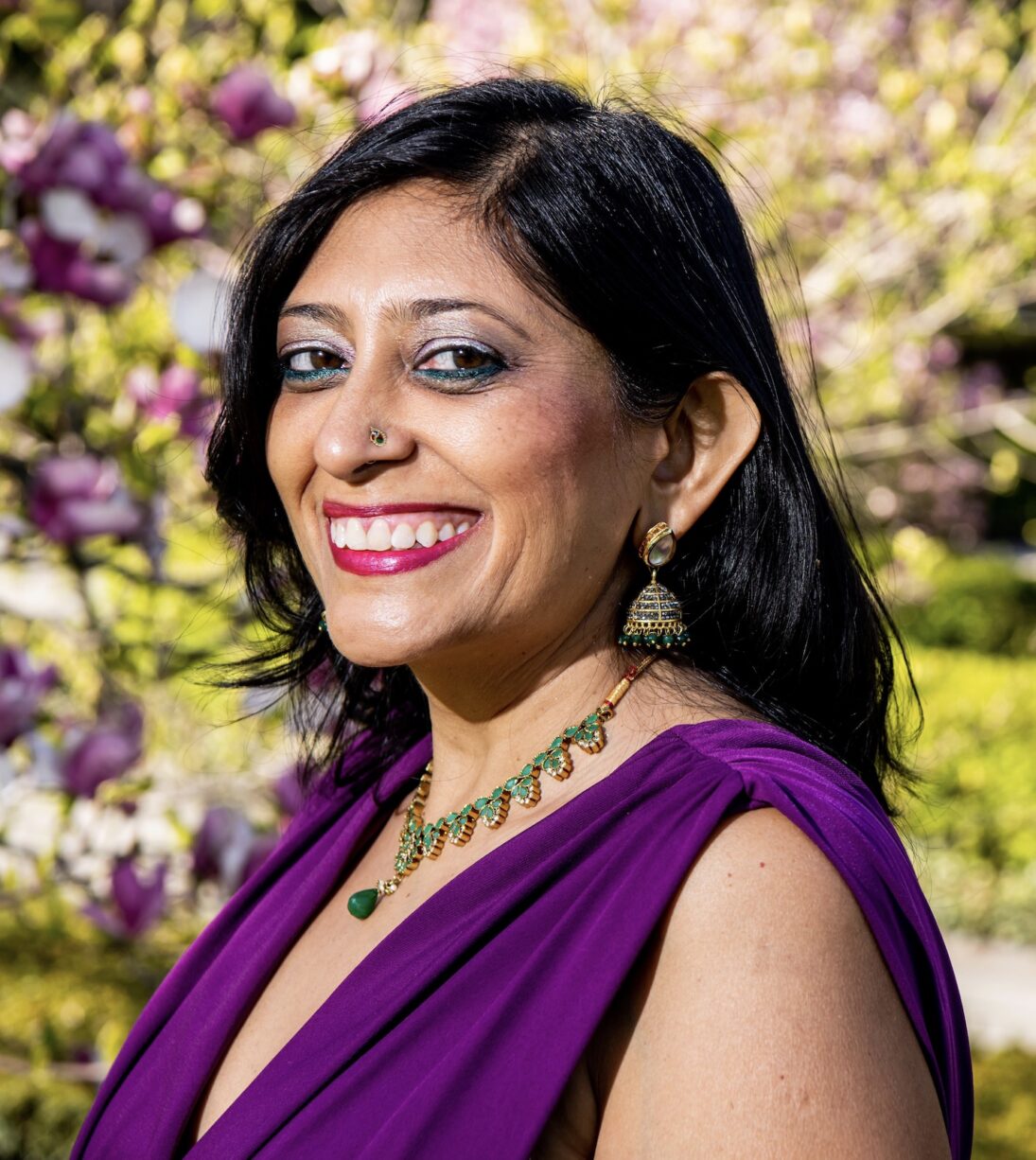
Catching up with Poetry Prize Winner Purvi Shah
October 8, 2024 | blog, news, Prizes


Her most recent book, Miracle Marks (Northwestern UP, 2019), investigates gender violence and sacred survivals. Her prize-winning debut, Terrain Tracks (New Rivers Press, 2006), plumbs migration and loss. With Anjali Deshmukh, she creates interactive public art like Missed Fortunes, a community healing archive which documented pandemic rituals through poetry & visual art prints. Purvi relishes sparkly eyeshadow, raucous laughter, and seeking justice.
SP: Throughout the piece you make use of the pronoun “you” to address the reader. Why did you choose to go this route?
PS: These days, language is used to separate us. I see poetry as a space to build and examine connection—particularly between a writer & readers who co-create the world through their experiences.
In “Whistle”, I want you to wrestle with the reasons migrants leave their homes, with the distress of being detained, the terror of facing unwanted medical procedures without anyone around to help you. The “you” brings readers into the subject position to feel constraint – and courage: this courage to cross rivers when escaping violence, a courage to speak up for yourself even when the cost is great, courage to see choices are not equal and we, who do have more choices, should not accept this inequity.
Through the invitation of becoming a “you” that is also an “I”, I am provoking connection, a delving of the humanity of others – and our own. With this use of “you”, I am not suggesting our lives, our experiences are the same or that we can so easily walk in someone else’s shoes. Our world would be different if it were so simple.
And yet, I am challenging us to make visible the political structures that value some of our lives while demeaning and restricting folks who already were vulnerable and had fewer choices to choose from. In our era of angry rhetoric, deliberate lies, and alienation, I hope “Whistle” provides an alternative: a space for deeper feeling, connection, and mobilization for shared humanity.
SP: In a polarized political climate regarding ICE, deportation, immigration and documentation what role did you intend your poem to play?
PS: In the U.S., we recently endured a lie repeated over and over: migrants are eating cats and dogs. Our everyday climate is one of hostility and dehumanization—toward Muslims, immigrants, women, and vulnerable groups. These voices promoting division and hatred are loud, proud, and relentless. In “Whistle,” I seek to amplify another voice: the courageous decision by Jaromy Floriano Navarro to speak up against injustice despite life-changing consequences.
Politicians play with emotions and devastate real lives. On the other hand, poetry can offer us a space to consider the dimensions and nuances of life, to recalibrate our moral compass, to ask: what choices do we really have? Why does a mother make difficult, even dangerous, choices? What is fair? How are we implicated in unfairness? In our body politic, who gets to have voice? How can poetry offer space for voices cast to the side?
Poetry allows us to share stories that reach people through the heart, mind, and whole body. In “Whistle”, I counter a dehumanizing “Otherness” to bring us closer to the experience of what it means to have dreams, a family, a life story erased by mainstream politicians and media – all while you are detained, subject to medical abuse, and fighting for your bodily autonomy.
SP: How was this poem impacted by your own experience as an activist and Indian immigrant?
PS: As an advocate for immigrant survivors of violence, I know the majority of incarcerated and detained women have faced physical, sexual, emotional, economic, and other violences. And survivors have very few real choices of how to live without violence. Many people do not understand the complexities of fleeing violence or trying to reinvent your life – especially when there is little family, community, and/or government support. In “Whistle”, I give texture to the violences women face, the small world of choices available, and the remarkable courage people still show in order to pursue freedom and well-being.
As I researched this medical abuse of detainees, I was disturbed to discover the doctor performing these non-consensual procedures is an Indian immigrant like myself. This made me ask: What does it mean to gain access to America through enacting violence on other immigrants? As an immigrant, I understand the demands of assimilation – and the rewards that the state and society offer. But I feel a pit in my stomach that we can gain entry by stepping on others. I envision a different kind of belonging that doesn’t cost us our humanity.
As an immigrant, I’m also keenly aware of the depictions of “good” immigrants vs. “bad” immigrants – and how these simple narratives belittle us all while furthering division. It’s easier to divide and to propagate disgust than it is to advance real solutions to complex political, economic, and legal issues. Again, poetry asks us to go beyond simple binaries to the textures of why, how, and what else we need to make new.
SP: Are there any poets, writers, or activists you drew inspiration from while writing this piece?
PS: This summer, as I taught a class of poetry & poetics to students in Palestine, I began with Audre Lorde’s “Poetry Is Not a Luxury.” Some of Lorde’s lines that resonate for me with “Whistle” is when she says, “For women, then, poetry is not a luxury. It is a vital necessity of our existence. It forms the quality of the light within which we predicate our hopes and dreams toward survival and change, first made into language, then into idea, then into more tangible action.”
I hope “Whistle” offers a clear light. In this era when women’s bodily autonomy has been eroded and constantly threatened, I hope “Whistle” is a wake-up call.
I hope we will all blow the whistle towards justice.
Submissions for the swamp pink Poetry Prize open on January 1st and will close January 31st.
Submit your work here.
With a $20 entry fee, writers may submit up to 1-3 poems. Winners receive $2,000 and publication. All entries will be considered for publication, and more than one story may be entered.
Before you submit, please remove your name and any other identifying information from your manuscript. Simultaneous submissions are okay, as long as you contact us should the work be accepted elsewhere.
